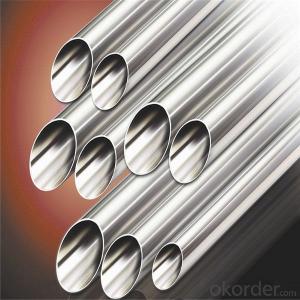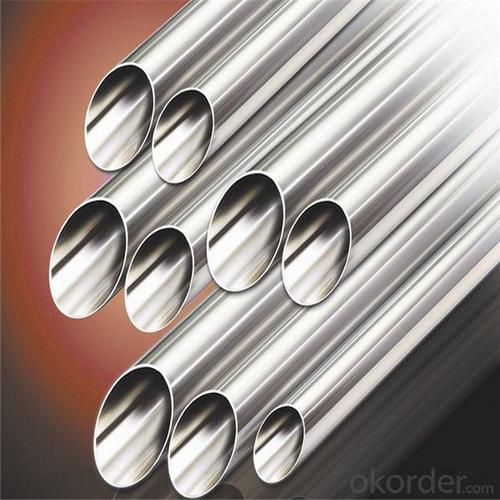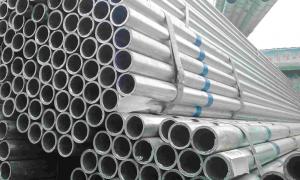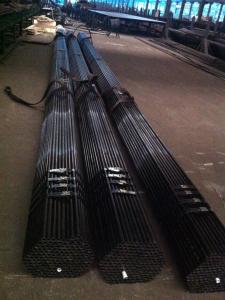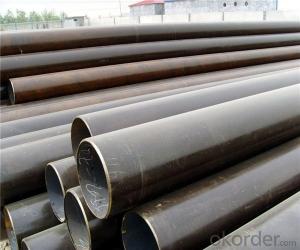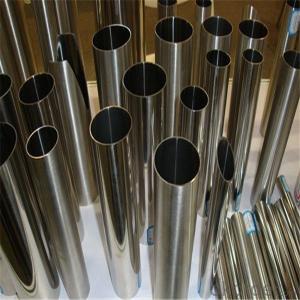Steel pipe with the most popular reputatoin in China
- Loading Port:
- Tianjin
- Payment Terms:
- TT OR LC
- Min Order Qty:
- 1 pc
- Supply Capability:
- 10000 pc/month
OKorder Service Pledge
OKorder Financial Service
You Might Also Like
Specification
1.Structure of Seamless Pipe ASTM A106/53:
Seamless pipe is formed by drawing a solid billet over a piercing rod to create the hollow shell. As the manufacturing process does not include any welding, seamless pipes are perceived to be stronger and more reliable. Historically seamless pipe was regarded as withstanding pressure better than other types, and was often more easily available than welded pipe.
2.Main Features of the Seamless Pipe ASTM A106/53:
• High manufacturing accuracy
• High strength
• Small inertia resistance
• Strong heat dissipation ability
• Good visual effect
• Reasonable price
3.Seamless Pipe ASTM A106/53 Specification:
Standard | GB, DIN, ASTM ASTM A106-2006, ASTM A53-2007 |
Grade | 10#-45#, 16Mn 10#, 20#, 45#, 16Mn |
Thickness | 8 - 33 mm |
Section Shape | Round |
Outer Diameter | 133 - 219 mm |
Place of Origin | Shandong, China (Mainland) |
Secondary Or Not | Non-secondary |
Application | Hydraulic Pipe |
Technique | Cold Drawn |
Certification | API |
Surface Treatment | factory state or painted black |
Special Pipe | API Pipe |
Alloy Or Not | Non-alloy |
Length | 5-12M |
Outer Diameter | 21.3-610mm |
Grade | 20#, 45#, Q345, API J55, API K55, API L80, API N80, API P110, A53B |
Standard | ASME, ASTM |
1) Material:20#(ASTM A 106/A53 GRB.API5LGRB,GB),45#,16Mn,10#.
2) Specification range:OD:21.3-610mm,WT:6-70mm,length:6-12m or according to the requirement of clients.
3) Excutive standards:GB,ASME API5L.ASTM A 106/A53,Despite of the above standards,we can also supply seamless steel pipe with standard of DIN,JIS,and so on,and also develop new products according to the requirements of our clients!
4) Surface:black lacquered,varnish coating or galvanized.
5) Ends:Beveled or square cut,plastic capped,painted.
6) Packing:bundles wrapped with strong steel strip,seaworthy packing.
4. Application of
Stainless steel pipe is used for structural and piping applications that require the properties that stainless steel delivers – high strength, toughness and excellent corrosion resistance. The pipe is available in sizes 1/2" through 36” in outside diameter (OD) and schedules 05S through 80S and larger for wall thickness (WT). It is available as welded and seamless. Stainless pipe has a dull gray, mill finish.
Seamless stainless pipe is used for applications that require internal pressure within the pipe such as process equipment, water treatment and marine applications. Welded pipe is used for structural applications that are exposed to corrosive environments such as marine and external applications. These include handrails, poles and support piping.
Packaging Details: | seaworthy package,bundles wrapped with strong steel strip |
Delivery Detail: | 50-60days after received 30%TT or Original LC |
6.FAQ of Seamless Pipe ASTM A106/53:
A. How is the quality of your products?
Our products are manufactured strictly according to national and internaional standard, and we take a test on every pipe before delivered out. If you want see our quality certifications and all kinds of testing report, please just ask us for it.
Guaranteed: If products’ quality don’t accord to discription as we give or the promise before you place order, we promise 100% refund.
B.How about price?
Yes, we are factory and be able to give you lowest price below market one, and we have a policy that “ for saving time and absolutely honest business attitude, we quote as lowest as possible for any customer, and discount can be given according to quantity”,if you like bargain and factory price is not low enough as you think, just don’t waste your time.Please trust the quotation we would give you, it is professional one.
C.
Why should you chose us?
Chose happens because of quality, then price, We can give you both.Additionally, we can also offer professional products inquiry, products knowledge train(for agents), smooth goods delivery, exellent customer solution proposals.Our service formula: good quality+good price+good service=customer’s trust
SGS test is available, customer inspection before shipping is welcome, third party inspection is no problem.
Any question, pls feel free to contact us !
- Q: How are steel pipes classified based on their schedule?
- Steel pipes are classified based on their schedule, which refers to the thickness of the pipe walls. The schedule classification system includes different numerical values, such as Schedule 10, Schedule 40, and Schedule 80, to categorize pipes with varying wall thicknesses.
- Q: What are the common methods of joining steel pipes?
- The common methods of joining steel pipes include welding, threading, and using mechanical couplings. Welding involves fusing the pipes together using heat, while threading involves screwing the pipes together using threads on the ends. Mechanical couplings are devices that connect the pipes together using compression or other means.
- Q: How are steel pipes used in the manufacturing of power plants?
- Steel pipes are commonly used in the manufacturing of power plants for various purposes such as transporting fluids, gases, and steam. They are utilized for the construction of pipelines that carry water, fuel, and coolant to different parts of the power plant. Additionally, steel pipes are employed in the creation of boiler tubes and heat exchangers, which play a crucial role in the generation of steam and transfer of heat in power plants.
- Q: What are the different testing methods for steel pipes?
- There are several testing methods for steel pipes, including visual inspection, ultrasonic testing, magnetic particle testing, dye penetrant testing, radiographic testing, and hydrostatic testing.
- Q: How do steel pipes perform in extreme temperature variations?
- Steel pipes perform well in extreme temperature variations due to their high thermal conductivity and resistance to expansion and contraction. They are able to withstand both high and low temperatures without losing their structural integrity or experiencing significant changes in dimensions. This makes steel pipes suitable for a wide range of applications, including those in industries with extreme temperature conditions, such as oil and gas, chemical processing, and power generation.
- Q: What is the minimum wall thickness for steel pipes?
- The minimum wall thickness of steel pipes varies depending on different factors, including the pipe's intended use and the specific industry standards and regulations. Determining the minimum wall thickness generally involves considering factors like the pipe's diameter, material strength, and the pressure or load it will experience during operation. In the oil and gas industry, for instance, the minimum wall thickness for steel pipes is typically specified by industry standards such as API 5L or ASME B31.3. These standards take into account elements such as the pipe's diameter, the material's yield strength, and the maximum pressure it will encounter. In other applications, such as structural or mechanical engineering, the minimum wall thickness for steel pipes is determined by factors like the pipe's intended load-bearing capacity, the desired safety factor, and any relevant building codes or regulations. To establish the specific minimum wall thickness requirements for steel pipes in a particular application, it is essential to consult the appropriate industry standards, codes, or regulations.
- Q: How are steel pipes used in the construction of industrial facilities?
- Steel pipes are commonly used in the construction of industrial facilities for various purposes such as transporting fluids, gases, and steam, as well as providing structural support and carrying electrical wiring. They are durable, resistant to corrosion, and can withstand high pressure and temperature, making them ideal for industrial settings.
- Q: How many meters per ton of steel tube?
- General scaffolding tube diameter 40mm, specifications specify wall thickness of 3.5mm, the actual wall thickness of 3.2 - 3.4mm.The theoretical weight per meter is 3.85kg and the wall thickness is 3mm.Hence a ton of steel is about 260m.
- Q: What is the difference between steel pipes and copper pipes?
- Steel pipes and copper pipes differ in their material composition, durability, cost, and application. Steel pipes are made of an alloy of iron and carbon, providing them with high strength and resistance to corrosion. Copper pipes, on the other hand, are made solely of copper, which offers excellent heat conductivity and resistance to bacterial growth. While steel pipes are more durable and suitable for high-pressure applications, copper pipes are commonly used for plumbing systems due to their malleability, ease of installation, and ability to withstand extreme temperatures. Additionally, copper pipes tend to be more expensive than steel pipes.
- Q: What is the impact resistance of steel pipes?
- Steel pipes have a high level of impact resistance thanks to the natural properties of steel. Steel, known for its strength and durability, can endure substantial external forces and impacts without deforming or breaking. The impact resistance of steel pipes is further improved by their construction and design. Various manufacturing techniques, such as seamless or welded construction, are used to create steel pipes, ensuring uniformity and strength throughout the structure. This construction process eliminates weak points or seams that could compromise the pipe's impact resistance. Additionally, steel pipes can be customized to meet specific impact resistance requirements based on their intended use. Different grades and types of steel can be utilized to achieve varying levels of impact resistance, allowing for customization to suit different industries and environments. The excellent impact resistance of steel pipes is particularly advantageous in industries such as construction, oil and gas, and transportation. These industries subject pipes to heavy loads, pressure, and potential impacts. Steel pipes can withstand these harsh conditions, making them a dependable choice for a wide range of applications. To summarize, steel pipes have outstanding impact resistance due to the inherent strength and durability of steel, as well as the construction techniques employed during manufacturing. Steel pipes can withstand significant external forces and impacts, making them a reliable and sturdy option for various industries and applications.
Send your message to us
Steel pipe with the most popular reputatoin in China
- Loading Port:
- Tianjin
- Payment Terms:
- TT OR LC
- Min Order Qty:
- 1 pc
- Supply Capability:
- 10000 pc/month
OKorder Service Pledge
OKorder Financial Service
Similar products
Hot products
Hot Searches
Related keywords
